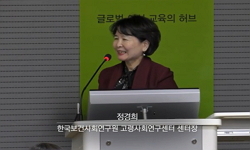The modern society is flooded with Western thoughts from the basis level and is rapidly entering an era of Western, urban and information. Consequently, the awareness and values of the traditional filial piety is fading away in the modern people. Such...
http://chineseinput.net/에서 pinyin(병음)방식으로 중국어를 변환할 수 있습니다.
변환된 중국어를 복사하여 사용하시면 됩니다.
- 中文 을 입력하시려면 zhongwen을 입력하시고 space를누르시면됩니다.
- 北京 을 입력하시려면 beijing을 입력하시고 space를 누르시면 됩니다.
효교육이 노인복지에 미치는 영향 - 노인학대 문제를 중심으로 - = Effects of Education on Filial Piety on the Welfare for the Aged - Targeted on the elder abuse issues -
한글로보기https://www.riss.kr/link?id=A106605108
- 저자
- 발행기관
- 학술지명
- 권호사항
-
발행연도
2019
-
작성언어
-
- 주제어
-
KDC
300
-
자료형태
학술저널
-
수록면
163-196(34쪽)
- 제공처
-
0
상세조회 -
0
다운로드
부가정보
다국어 초록 (Multilingual Abstract)
The modern society is flooded with Western thoughts from the basis level and is rapidly entering an era of Western, urban and information. Consequently, the awareness and values of the traditional filial piety is fading away in the modern people. Such changes in the life style and way of thinking of the people have caused rapid changes in the structure of the society. The lack of the most important aspects of education, Korean traditional filial piety and values, is causing serious social issues. Moreover, adults are also getting out of the bounds, which can be easily observed by the embossing news on television about the sex and corruption scandals of politicians, economists, legal processions and celebrities.
The traditional idea of filial piety is based on the Korean educational culture, in which children grow up in family, learning to respect and serve parents and to build friendship between siblings. Consequently, the family concord is expanded to consideration and love towards other people in the community. However, the lack of filial behaviors in the current society and families has led to increasing rate of elder abuses.
According to National Statistics Office, as of 2018, the population of the elders at the age of 65 or above is 7,381,000, which is 14.3% of the total population, indicating that the society is aging. The rapid decrease in the birthrate and increase in the average life expectancy have caused the elder support to be not only an issue in families, but also a national problem, which is exposed in the society in forms of elder abuse in the society. The elder abuse is action of a violation of human rights of the elders and adults, who need to be respected and guaranteed of their rights. If the younger generations get used to witnessing the elders being abused in families and the society that they have served for their whole life, the same problem will be repeated over generations. Thus, researches on the elder abuse are crucial to prevent the elder abuses, to form bonds between generations and to secure the rights and values of people in the society.
According to the Ministry of Health and Welfare, there was total number of 21,500 elder abuse cases from 2014 to 2018. The number has reached 5,200 in 2018, since when it has been annually increasing.
The elder abuse has become a global issue, which can be reflected by the celebration of every 15th of June as a ‘World Elder Abuse Awareness Day,’ designated by the UN and INPEA in 2006. Later, the Ministry of Health and Welfare, the central elder protection agencies and the local elder protection agencies have proposed various actions and plans, such as ‘elder abuse prevention campaign,’ endeavoring to enhance the awareness of the society on the elder abuse issues and to prevent and improve unfair treatment of the elders.
Correspondingly, it is critical for the education and social bodies to recognize the issue of filial piety as a problem beyond an ethical concern of individuals and to study the education of filial piety in the society in depth.
The purpose of this research is to seek for a detailed solution for the reestablishment of the ethical and moral framework in the families, schools and the society, so that the education on the idea of the filial piety in the Korean traditional ethics can be effectively implemented in the current education system.
Therefore, this paper points out the blind spots in the current educational system, which neglects the education of filial piety, and strongly suggests to add the aspect of filial piety to the regular national curriculum by the national policy.
동일학술지(권/호) 다른 논문
-
학교교육의 윤리교육문제와 전통적 효와 오륜의 현대적 수용 - 『소학』을 중심으로 -
- 한국청소년효문화학회
- 김익수 ( Kim Ik-soo )
- 2019
-
- 한국청소년효문화학회
- 김용길 ( Kim Yong-kil )
- 2019
-
- 한국청소년효문화학회
- 민정기 ( Min Jung-ki )
- 2019
-
- 한국청소년효문화학회
- 장정태 ( Jang Jeong-tae )
- 2019





 KISS
KISS






